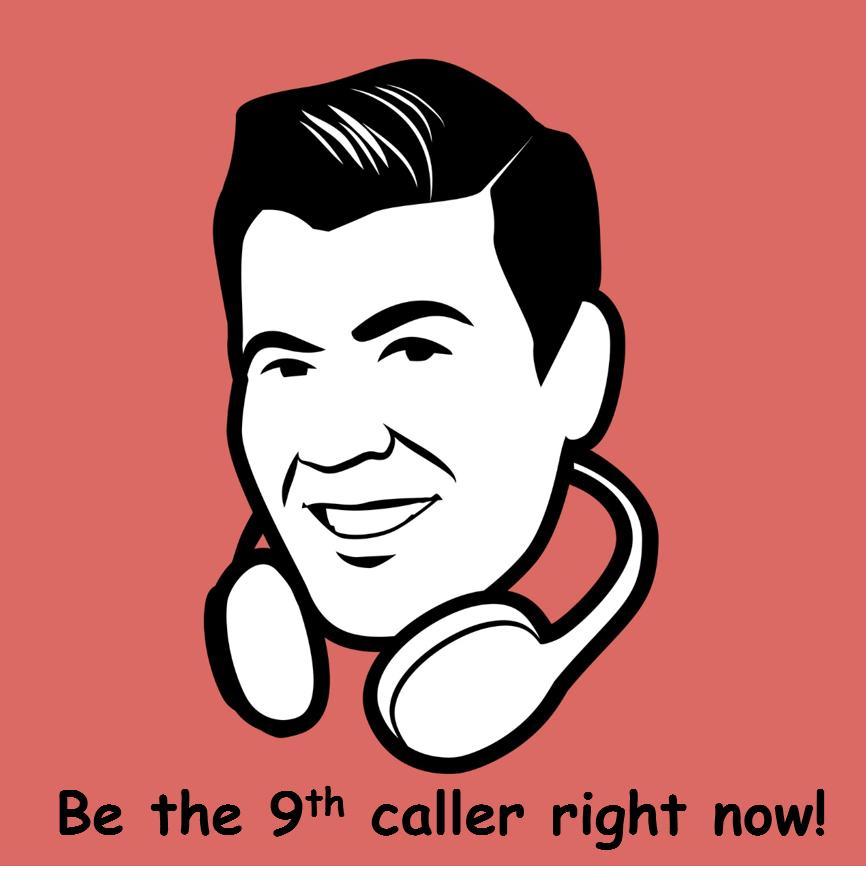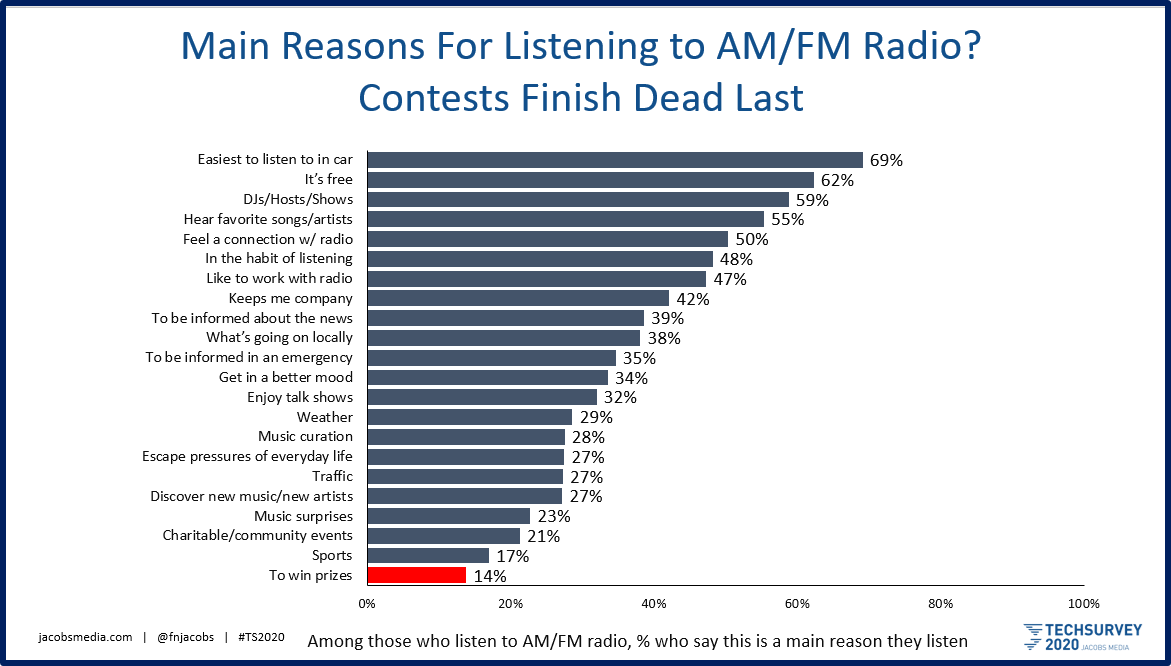
If you’ve worked in the radio business for any length of time, chances are quite good that contesting has played a role in your career arc. It’s impossible to know when the very first radio giveaway took place, but it was likely well before the advent of television.
And through the modern era of radio, contesting has played an important role in audience building and branding. Giving away everything from concert tickets, family 4-packs, cars, homes, and yes, tote bags, radio stations have often defined themselves with their contest signatures. The biggest companies in radio almost all participate in “national contests,” spreading the wealth across hundreds of stations throughout the country.
And when I look back on my career – as a researcher, programmer, and a consultant – the art of contest design and execution has been there all along.
Today’s post is the first of a two-parter – first, looking at why contesting has played an integral role in how radio has traditionally presented itself. And in tomorrow’s post, a story of a contest meltdown, loaded with important lessons for all of us in radio.
But first, let’s take a look at the inherent dangers and risks that come with radio contesting.
Before forming Jacobs Media, I was blessed to work for two incredible companies. At Frank N. Magid & Associates, embedded in the corn fields of Marion, Iowa, I learned the research ropes, working for some of the biggest broadcast media companies on the planet, and alongside some of the smartest research and marketing minds.
Then I was honored to join ABC during the days when their radio group was a powerhouse. I was surrounded by an elite group of programmers and dynamic executives who mentored and trained me, setting a great example for radio broadcasting excellence that I’ve tried to bring to my consulting efforts. Both Magid and ABC Radio provided the perfect foundation for eventually launching my own company.
One of the areas in which we PDs were required to excel was in contest design – their integrity, rules, and construction. And ABC had a legal department whose goal was to ensure none of us jeopardized the station licenses in the process of giving prizes away. Back then, companies were limited to owning just 7 AMs, 7 FMs, and 5 TV stations. Those pieces of paper from the FCC were considerably more valuable and precious then they are today.
ABC’s battery of lawyers worked with us programmers, preventing us from getting their stations – and the parent company – in trouble. We were taught the old saying – “It is easier to ask for forgiveness than to ask for permission” – was not an acceptable philosophy at ABC. “Legal” emphasized that our every move would be scrutinized if something went wrong. So, it was paramount to get out in front of anything that could potentially backfire or create damage.
There were two young, aggressive, and smart ABC lawyers who counseled us, challenged us, pushed us, and at times frustrated us – but we learned the law as it pertained to broadcast. Chris Hikawa and Letty Tanchum were our go-to legal advisors, the ones who answered our calls whenever we had a query – or a problem.
As someone who took the LSATs once but decided not to go into law, I ended up learning a ton about contest design, rules, procedures, and key requirements like price, chance, and consideration from ABC Legal. Before you picked up the phone to ask Chris or Letty about a proposed promotion or giveaway, you were wise to think it all through in advance. Otherwise, you lost a little “face” along the way.
Like all good legal advisors, they were inclined to respond with a “no” to questions that weren’t smart or well-formed. And so you rapidly learned the questions to ask, as well as the likely ways “legal” might challenge your assumptions before engaging them.
I have carried those lessons with me all these decades later. To this day, I challenge the programmers we consult about contests, poke the occasional holes in their logic, and always suggest they “run it all by legal.”
Contests are misunderstood by many in and out of radio. When you present the list of things radio listeners care most about, contests and giveaways typically end up at or near the bottom of the heap. We obviously spend most of our attention on the upper rungs of the “Why Radio?” hierarchy in our Techsurveys. But as I’ve highlighted below as main reasons why consumers listen to broadcast radio, “winning prizes” finishes last out of 22 different potential assets among core radio listeners.

Based on data like this, researchers who have never programmed or simply follow the numbers might conclude that giveaways have absolutely no place on broadcast radio – ever. Many years ago, I had a long (frustrating) conversation with a newly minted radio executive who came from outside the broadcast business. He had seen data for his market, showing contests testing just above prickly heat and root canals as attractive concepts. It was hard to explain to him why contests were fixtures on so many stations.
And in fact, virtually every radio station engages in contests and similarly frivolous pursuits at one time or another, despite research suggesting this makes absolutely no rational sense.
So, why do they do them?
Three words.
Because. They. Work.
 And we’re not just talking about Top 40 stations or radio programming aimed at teens. Even All News stations usually feature contests as part of their programming – these days, many are engaged in those “national contests” I mentioned earlier, offering cash multiple times a day.
And we’re not just talking about Top 40 stations or radio programming aimed at teens. Even All News stations usually feature contests as part of their programming – these days, many are engaged in those “national contests” I mentioned earlier, offering cash multiple times a day.
If you think public radio is exempt from these types of shameless bribes, think again. Every pledge drive and fundraising event is almost always replete with premiums, prizes, drawings, and yes, bribes. Oftentimes, the most generous givers are fixated on new prize offerings they’ll receive if they donate particular levels of support. Public radio insiders know It totally matters what types of premiums, come-on, incentives, and carrots are offered on the ultimate success of these critically important efforts.
We programmers know that when you become parochial about interpreting audience research, you miss the emotional elements that often accompanies radio listening. That’s one of the reasons why we’ve always recommended a mix or blend of qualitative research preceding the statistical – to hear fans and even casual listeners talk about what they value and why. Rarely do you see this in black and white spreadsheets or colorful pie and bar charts, but focus and L.A.B. groups often reveal certain truths – whether we’re looking at commercial, public, or Christian radio listeners.
And then there’s the matter of ratings. Those of us who have been doing this a while have made what appears to be an undeniable connection between the types of people likely to fill out a diary or carry a meter, and those prone to play radio contests. That linkage may even be more important in the largest PPM markets, where panelists are incentivized to participate for as long as a year – or two – with cash and other goodies designed to keep them and their families engaged, content, and compliant.
Contests are as much a part of radio – here in America and around the world – as music, personalities, news and information. At one time or another,  just about everyone has tried to be that elusive 9th caller, attempted to win that trivia contest, or even went for grabbing one of those 99 keys, one of which that might start that brand new car.
just about everyone has tried to be that elusive 9th caller, attempted to win that trivia contest, or even went for grabbing one of those 99 keys, one of which that might start that brand new car.
In tomorrow’s post, I’ll tell you an amazing story about a radio contest gone very wrong. It took place in a radio market far, far away from us here in the U.S., but its lessons are important and relevant, especially in today’s entertainment environment.
One of the most important elements in contest design – beyond getting the legal department’s OK – is to pressure-test a giveaway by relentlessly considering a key question:
What can possibly go wrong?
And that’s the question that is often the cause of so many contest fails – especially the epic ones.
- What To Do If Your Radio Station Goes Through A Midlife Crisis - April 25, 2025
- A 2020 Lesson?It Could All Be Gone In A Flash - April 24, 2025
- How AI Can Give Radio Personalities More…PERSONALITY - April 23, 2025




Love the story. It hits home. I have a couple of promotions that did not pass the pressure test that I will remember forever. And thousands that did that I will not. Funny how it’s always the one that gets away, isn’t it?
Our new PD came from a frugal station group to ABC and we had managed to get all of our contests sponsored to save money. It was my first year as Promotion Director. Our admin reminded me near the end of the year that we had a huge surplus in our prizing budget (who has THAT anymore?!?) and that if we didn’t use it, during budgeting for next year, that number would be reduced! Only having 5 days left in the fiscal (and Arbitron) calendar, the PD and I concocted a quick easy music based promotion. We would splice small parts of 20 songs together, play them and have listeners call in and name all 20 songs and artists. Impossible, right? Our contest name showed the amount of thought we put into the contest.
BITS O’ TUNES FOR CASH
But with a prize of $10,000 it made for riviting listening. Only one thing. We underestimated our audience’s musical knowledge and cassette recording ability. No one would get it on the first guess. But when we played it again later that day, no one missed it on the second guess. We emptied the “prizing” budget and had the best Fall book in a long time!!
PS. The station changed ownership the next year and all of our budgets were reduced. But for some reason 35 years later, I still remember BITS O’ TUNES FOR CASH
You never forget those moments, Scott. I still have dreams (nightmares) about “5 in a row or $5,000” as some unnamed former WRIF jocks would tell you.
Had to add this from WKRP – great post
https://www.youtube.com/watch?v=fV1KHQ5iiew
I forgot about this. Great bit & a perfect segue into tomorrow’s post. Thanks for the reminder, Dave – a great WKRP segment.
I immediately thought of this when I was reading Scott’s comment.
Given that the late Hugh Wilson said many times that some of the best WKRP storylines came from actual events at radio stations, I wonder if the clip Dave posted was based on Scott’s experience.
Speaking of which, when planning a promotion, do remember what Arthur Carlson said as the famous last line of the most famous episode of WKRP:
https://www.youtube.com/watch?v=LH0gcYgqOgM
No doubt Hugh Wilson used “real life” (if that’s what we can call radio) for story inspiration. Thanks for chiming in, KM.
When we did 16 in a row or $5000 sets, I remember budgeting an extra $5K to account for inevitable human error and had to use it once.
I can’t help but reaching a conclusion – the audience doesn’t care and by presumption would rather hear another song or bit than a contest. But Nielsen participants tend to like them. So radio is alienating most of its audience to pander to diary/PPM people. Maybe that’s worth it, maybe it isn’t. Has a large group ever done a “no contest” test to see what happens to the ratings?
I get contesting in a cool way or offering cool stuff to add to a station’s image. But 10th caller/win it before you can buy it stuff should have been ditched with VHS tapes. The research says they want music and company more than t shirts.
Actually, Bob, those were my favorite contests – the ones that had prizes people wanted to win (ratings) but also items that contributed to the brand There was a time when classic cars filled both needs, as well as becoming a more popular promotional tool than some DJs. Thanks for chiming in on this.
Somehow in a lot of cases the impact of “contests” has been really lost. My first contest win was a bottle of ginger ale in the 50s. The station continued it’s “contests” with a litter box campaign that offered a first aid kit (about .95 value) when your litterbox serial number was read on the air. We realized they were doing them sequentially and knew exactly when we’d win. It grew with “Cash Call” and then Jack McCoy’s “The Last Contest” was the penultimate contest. This was the tipping point from the vehicle (HOW to win) to the reward (WHAT to win). Subsequent contests I’ve conducted always consider the entertainment value for the listener. I’m not gonna win the new car on “The Price Is Right” but I always get a kick out of the games they play in the process. That show hasn’t been on the air since 1956 because they take the “Tenth Caller”.
When done right, they can enhance the listening experience and advance the product branding. Remember word of mouth is still one of the best marketing tools, and it’s incumbent on radio people to do things worth talking about!! (“Thousand Dollar Minute” anyone). Thanks for this one, Fred. Can’t wait to read about your contest flubs… I got a million of ’em.
Funny, I was thinking about “The Last Contest” as I was writing the post. I’m glad someone else remembers it. You nailed it in your second paragraph, which I also wrote to Bob Bellin – the contests that were both tactical and strategic – or as Steve Goldstein called it, “tactegic” – were always my favorites. Thanks for commenting, Dave.
I still have nightmares about giving away a 69 Corvette in a reverse-lottery thing where each person got a key to open a treasure chest—one of the keys opened it and all the rest would not. Somehow the person who got the right key did not insert it correctly or something, so no one opened the chest. The rules said you had to be present to win, and most of the qualifiers left when their key did not work. Then it really went to hell. The rest of the story involved the local newspaper, a California state consumer affairs office and several qualifiers suing us. To top it off, the eventual winner of the Corvette ended up marrying one of the morning show hosts.
Dumpster fire all the way.
“I hate the music and DJs, but I love the contests.”
– said never by any radio listener
True that.